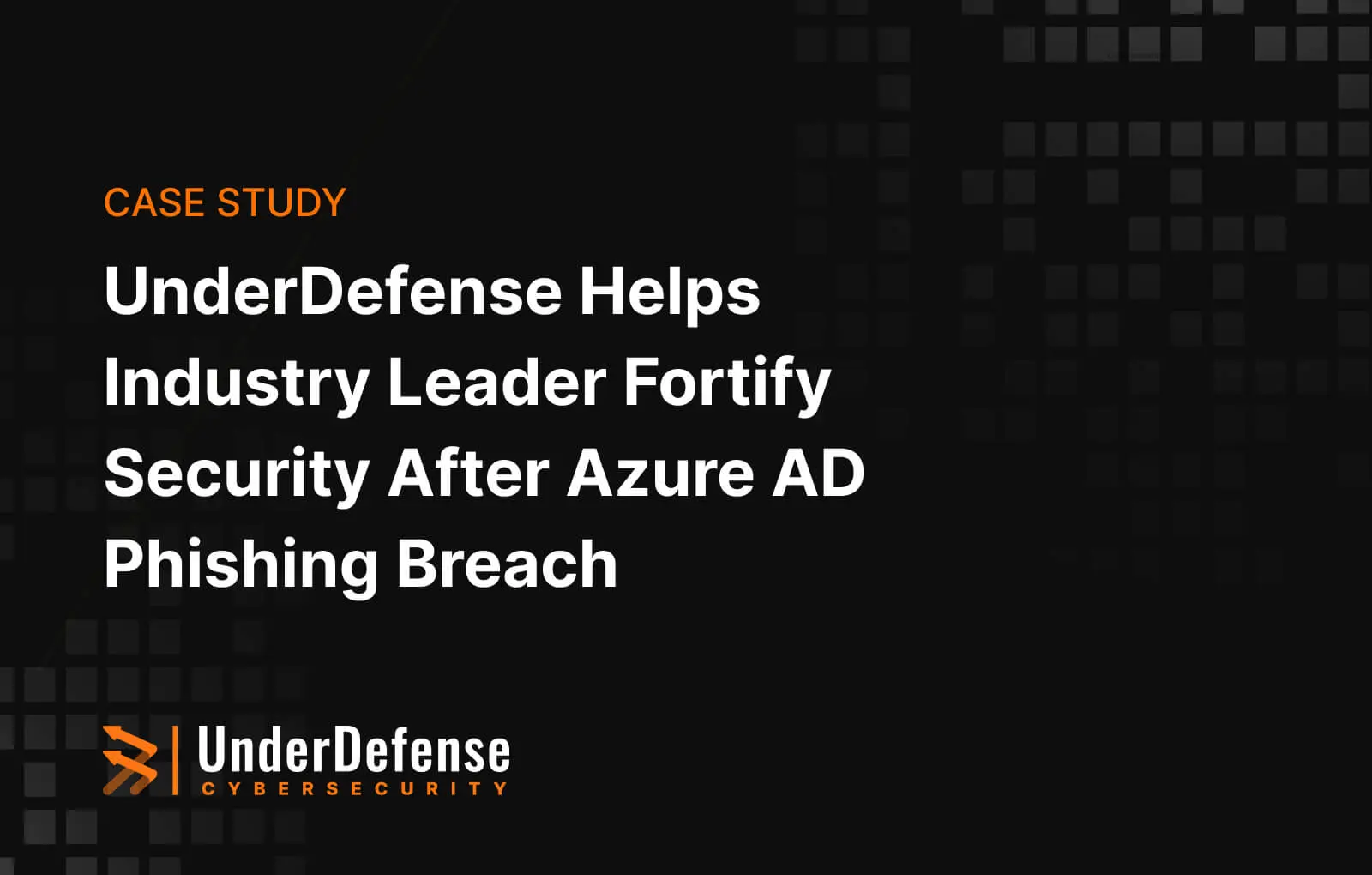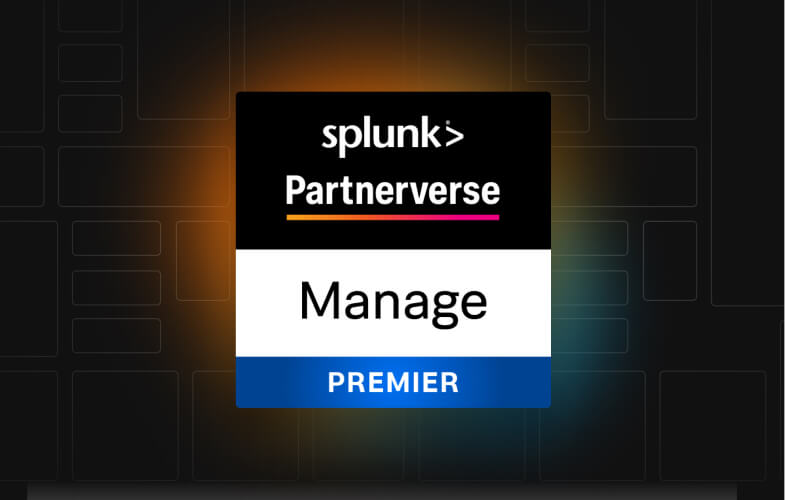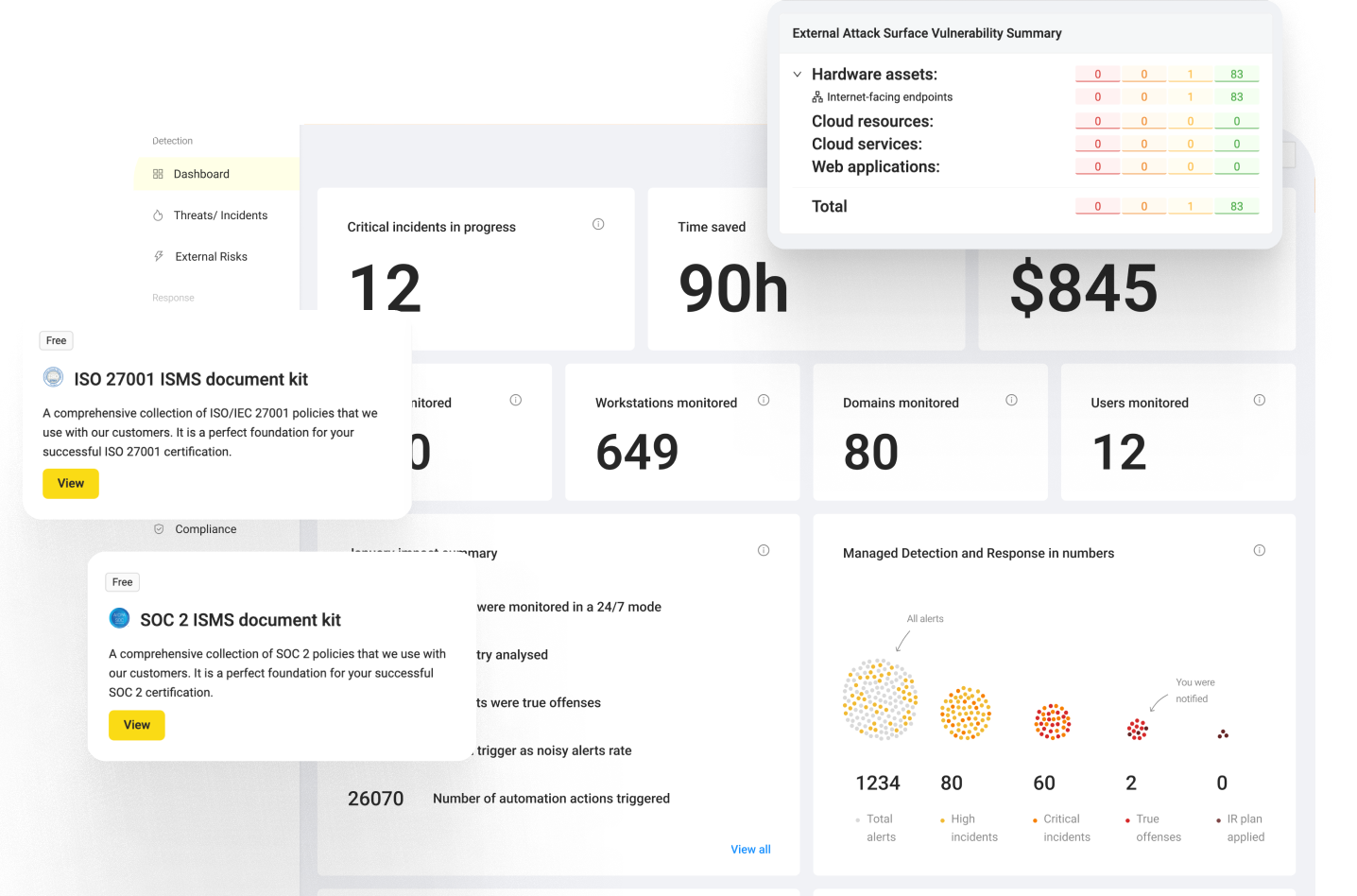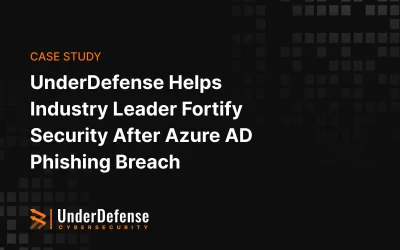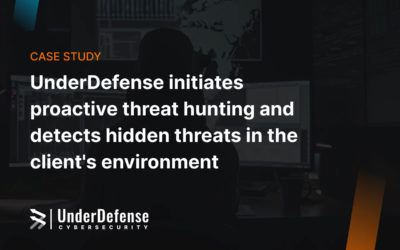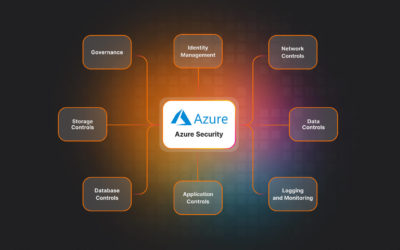Forget the question of “If” you need a pentest. In today’s threat landscape, with cyberattacks striking every 39 seconds, the critical question is, “How often?”
Penetration testing is crucial in fortifying your organization’s cybersecurity. By simulating real-world attacks, ethical hackers (pen testers) identify vulnerabilities in your systems before malicious actors can exploit them.
But with so many pentesting companies out there, choosing the right one can be daunting. In this blog post, we aim to provide you with a comprehensive guide to the top penetration testing companies for 2024.
List of TOP 10 pentest companies
1. UnderDefense

- Expertise: Specializes in offensive security testing, penetration testing, red teaming, and security assessments.
- Location: Global presence with headquarters in the United States and European offices.
- Team size: 100+ cybersecurity experts focusing on personalized service.
- Industries: Serving clients across various sectors, including finance, healthcare, critical infrastructure, and technology.
- Pros: Detailed reporting, professional attestation letters, and complimentary services, enhancing cybersecurity understanding, trust-building, and remediation effectiveness in a single package.
Ready to Discuss Your Pentesting Needs?
Learn how UnderDefense can help safeguard your organization’s digital assets and mitigate cybersecurity risks effectively
2 . Synack

- Expertise: Offers crowdsourced security testing services, including penetration testing and vulnerability assessment.
- Location: Based in the United States with a global network of security researchers.
- Team size: Large community of skilled researchers and security experts.
- Industries: Serving clients across industries, including technology, finance, and retail.
- Pros: Crowdsourced security testing, a large network of skilled researchers.
- Cons: May not offer as tailored services as traditional pentest firms.
3. CrowdStrike

- Expertise: Provides endpoint protection, threat intelligence, incident response services, and penetration testing.
- Location: Headquarters in the United States with a global presence.
- Team size: Extensive team of cybersecurity professionals specializing in threat detection and response.
- Industries: Serving clients across government, healthcare, and manufacturing sectors.
- Pros: Comprehensive security solutions and global presence.
- Cons: The main focus is on endpoint protection rather than solely on penetration testing.
4. Cobalt.io

- Expertise: Offers a platform for on-demand, continuous penetration testing services performed by a global network of ethical hackers.
- Location: Based in the United States with a distributed network of security professionals.
- Team size: Network of skilled, ethical hackers and security experts.
- Industries: Catering to various industries, including technology startups, e-commerce, and finance.
- Pros: On-demand, continuous testing, a global network of ethical hackers.
- Cons: Service offerings may be limited compared to more established competitors.
5. Veracode

- Expertise: Specializes in application security testing, including static analysis, dynamic analysis, and software composition analysis.
- Location: Headquarters in the United States with a global customer base.
- Team size: Large team of security researchers and software engineers.
- Industries: Serving clients across industries, focusing on software development and technology companies.
- Pros: Specialized in application security testing, large team of experts.
- Cons: May not offer as comprehensive services beyond application security.
6. Bugcrowd

- Expertise: Offers crowdsourced security testing services, including bug bounty programs, vulnerability disclosure, and managed crowdsourced testing.
- Location: Based in the United States with a global community of security researchers.
- Team size: Large network of ethical hackers and security professionals.
- Industries: Serving clients across various sectors, including technology, finance, and healthcare.
- Pros: Crowdsourced security testing, large community of researchers.
- Cons: May require more management oversight compared to traditional pentest engagements.
7. Invicti

- Expertise: Provides web application security testing solutions, including vulnerability scanning and penetration testing.
- Location: Headquarters in the United States with a global customer base.
- Team size: Dedicated team of security experts and software developers.
- Industries: Focused on clients in e-commerce, banking, and government.
- Pros: Web application security testing solutions, dedicated team.
- Cons: Focus limited to web application security, may not cover other areas of cybersecurity.
8. FRSecure

- Expertise: Offers cybersecurity services, including penetration testing, risk assessment, and compliance consulting.
- Location: Based in the United States, serving small to medium-sized businesses.
- Team size: Experienced team of security consultants and analysts.
- Industries: Catering to SMBs across various sectors, including healthcare, education, and manufacturing.
- Pros: Focus on SMBs and comprehensive cybersecurity services.
- Cons: Limited availability of reviews and ratings.
9. Cure53

- Expertise: Specializes in independent security audits and penetration testing of web applications and platforms.
- Location: Based in Germany with a global clientele.
- Team size: Small team of renowned security researchers and consultants.
- Industries: Serving clients in the technology, media, and finance sectors.
- Pros: Independent security audits, a renowned team of experts.
- Cons: Relatively small team compared to larger competitors.
10. Rapid7

- Expertise: Provides a suite of security solutions, including penetration testing, vulnerability management, and incident detection and response.
- Location: Headquarters in the United States with a global presence.
- Team size: Large team of security professionals with diverse expertise.
- Industries: Serving clients across technology, retail, and healthcare industries.
- Pros: Comprehensive security solutions, large team.
- Cons: Pricing may be a concern for smaller businesses.
Complete guide: How to choose the best penetration testing company
Following a systematic approach and asking the right questions, you can identify the ideal partner to safeguard your organization against cyber threats.
This comprehensive guide equips you with step-by-step instructions and valuable questions to consider, ensuring you select the best pentesting partner for your organization’s unique needs.
Not sure what type of security testing service you need?
Step 1: Define your needs
Begin by clearly outlining your goals and objectives for the penetration testing engagement. Determine what you aim to achieve, whether identifying vulnerabilities in specific systems, complying with regulatory requirements, or enhancing overall security posture.
Valuable questions to consider:
- What systems need testing? (Web applications, mobile apps, network infrastructure, cloud environments, etc.)
- What is your desired scope? (Black-box, white-box, gray-box testing)
- Do you have industry compliance requirements? (PCI DSS, HIPAA, etc.)
- What is your budget?
Step 2: Assess expertise and experience
Evaluate the expertise and experience of potential pentest companies. Look for firms with a proven track record of success, extensive experience in your industry, and certifications such as Certified Ethical Hacker (CEH), Offensive Security Certified Professional (OSCP), or Certified Information Systems Security Professional (CISSP).
Valuable questions to consider:
- How long has the company been in the penetration testing industry?
- Can they provide references or case studies from similar projects?
- What certifications and qualifications do their pentesters hold?
Step 3: Review methodologies and tools
Understand the methodologies and tools employed by each company during penetration testing. Ensure they utilize industry-standard frameworks such as NIST SP 800-115 or OSSTMM and employ manual and automated testing techniques for comprehensive coverage.
Valuable questions to consider:
- What methodologies and frameworks do they follow during pentesting?
- Do they utilize a combination of automated and manual testing techniques?
- Are their tools and techniques up-to-date with the latest industry standards?
Step 4: Evaluate reporting and communication
Assess the clarity and comprehensiveness of the reports provided by each pentest company. Look for detailed findings, prioritized recommendations, and actionable insights to enable your team to remediate vulnerabilities effectively. Additionally, consider their communication style and responsiveness throughout the engagement.
Valuable questions to consider:
- What does their typical penetration testing report include?
- How do they prioritize and categorize identified vulnerabilities?
- How do they communicate findings and recommendations to stakeholders?
Step 5: Consider cost and value
While cost is an important factor, prioritize value over price when selecting a pentest company. Consider the breadth and depth of services offered, the quality of deliverables, and the long-term benefits of partnering with a reputable firm that prioritizes your organization’s security.
Valuable questions to consider:
- What is the pricing structure for their penetration testing services?
- Do they offer additional services or support beyond the initial engagement?
- How does their pricing compare to other reputable pentest companies in the market?
Why UnderDefense is the best choice for you?
How UnderDefense might align with your needs | ||
If you require a comprehensive security assessment that goes beyond basic pentesting. | If you have a complex IT infrastructure or a high tolerance for risk. | If you value personalized service and a dedicated team of security experts. |
UnderDefense stands out as the best choice for several reasons:
- Proven expertise: With years of experience in the cybersecurity industry, we have a proven track record of success in conducting penetration tests for various clients across various sectors.
- Comprehensive methodologies: We employ comprehensive methodologies and industry-standard frameworks to ensure thorough assessments of your organization’s security posture. Our approach combines manual and automated testing techniques to uncover vulnerabilities effectively.
- Tailored solutions: Every organization is unique, so we tailor our penetration testing services to meet your needs and objectives. Whether you require a targeted assessment of critical systems or a comprehensive evaluation of your entire infrastructure, we have the expertise to deliver.
- Clear and actionable reporting: UnderDefense provides clear and actionable reports that prioritize identified vulnerabilities and provide practical recommendations for remediation. Our reports enable your team to address security issues promptly and effectively, enhancing your overall security posture.
- Responsive communication: Communication is key throughout the penetration testing process, and we are proud of responsive and transparent communication with our clients. We keep you informed every step of the way, ensuring clarity and peace of mind throughout the engagement.
- Commitment to value: We offer competitive pricing, high-quality deliverables, and ongoing support beyond the initial engagement. We are dedicated to helping you strengthen your defenses and effectively protect your business from cyber threats.
Schedule Your Penetration Testing Today
Frequently Asked Questions
What is the penetration testing cost?
The cost of penetration testing can vary widely depending on factors such as the scope of the test, the complexity of the systems being tested, and the expertise of the pentesting company. On average, a penetration test can range from a few thousand dollars to tens of thousands.
What is the usual process for pentest?
The usual process for a penetration test typically involves the following steps:
- Planning and scoping: Defining the test’s objectives, scope, and targets.
- Information gathering: Collecting relevant information about the target systems and infrastructure.
- Vulnerability analysis: Identifying and assessing vulnerabilities in the target systems.
- Exploitation: Attempting to exploit identified vulnerabilities to gain unauthorized access or perform other malicious activities.
- Reporting: Documenting findings, including vulnerabilities discovered, potential impact, and recommended remediation steps.
- Remediation: Assisting the client in addressing and fixing identified vulnerabilities to improve their security posture.
What are the types of pentests?
There are three main types of penetration tests, each with a different approach:
- Black Box Testing: Simulates an external attacker without prior knowledge of your systems.
- White Box Testing: The pentest team fully knows your systems and internal controls.
- Gray Box Testing: A hybrid approach where testers have some knowledge of the systems.
What is the difference between a vulnerability scan and penetration testing?
A vulnerability scan is an automated process that identifies known vulnerabilities in systems or applications by scanning them for common security issues. Penetration testing involves simulating real-world attacks to identify and exploit vulnerabilities in a controlled environment. While vulnerability scanning provides a broad overview of potential security risks, penetration testing offers a more comprehensive assessment by attempting to exploit identified vulnerabilities and assess their impact.
Can penetration testing disrupt business operations?
If conducted properly, penetration testing should not disrupt business operations in most cases. However, disruption is possible, especially if critical systems are targeted or testing is performed during peak business hours. To minimize the risk of disruption, penetration tests are often scheduled during off-peak hours, and appropriate precautions are taken to ensure that testing activities do not impact production systems or services. Additionally, communication and coordination between the pentesting team and the organization’s IT staff can help mitigate any potential disruptions.


